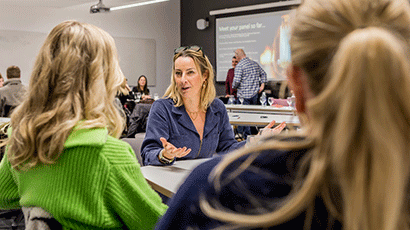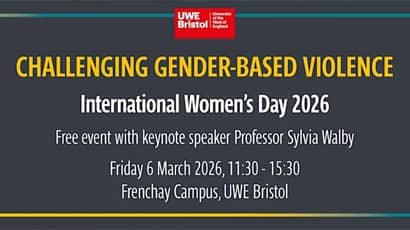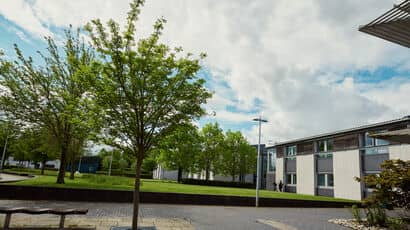Perceived discrimination and the violence continuum in the workplace
A seminar held by Valeria Insarauto
Key Information:
- Date and time
- Tue 18 April 2023
13:00 - 14:00 - Location
- TBC, Frenchay Campus, Further info
- Contact
- Ripley Williamson King ripley.williamsonking@uwe.ac.uk
- Cost
- Free
- Attendance
- Booking required
Description
Perceived discrimination and the “violence continuum” in the workplace: An enabling or opposing factor?
Abstract
Sexual harassment and violence remain persistent problems for women in the workplaces of many European countries. Broader social movements such as the global #MeToo have contributed not only to increase the visibility of these issues but also to showcasing women’s reinforced awareness about the necessity of denouncing and fighting workplace sexual harassment and violence far beyond the legal parameters.
Revisiting the feminist foundational works by Kelly (1988)[1] and Mackinnon (1979)[2], our article draws on the notion of sexual violence as a continuum to acknowledge such awareness and applies it in the context of work, whereby harassment can be considered a case of discrimination based on sex.
We argue that women’s perceptions of their working environment as discriminatory may also be critical to assessing risks and developing prevention initiatives in this context. We use data from the European Working Conditions Survey (2010 and 2015) to analyse the effects of female workers’ perception of discrimination on their likelihood of experiencing sexual harassment, physical violence, or multiple forms of violence. Here, perceptions of discrimination are divided into either perception of discrimination for gender reasons uniquely, or for gender at the intersection with other aspects of inequality (age, race, sexual orientation, etc.).
The results show that perceiving gender discrimination increases the likelihood of being exposed to sexual harassment, but this is especially so for women who perceive they are discriminated against also based on other aspects of inequality, who are also more likely to experience physical violence alone in addition to multiple forms of violence.
These findings support existing perspectives but also have important implications considering current workplace trends. They offer insights into how individual perceptions of discrimination can be considered an indicator of hostile working environments and can therefore contribute to informing risk assessment and prevention programs, with the particular aim of reaching the most vulnerable groups of female workers.
Speaker's biography
Valeria Insarauto is a postdoctoral researcher at the University of Lausanne, Switzerland. Sociologist, Ph.D. from the École des Hautes Études en Sciences Sociales (School of Advanced Studies in the Social Sciences) in Paris, she was a teaching and research associate at Aix-Marseille University in France, a postdoctoral researcher at the School of Advanced Hispanic and Iberian Studies in Madrid Spain, and senior researcher at the Centre in Gender studies of the University of Lausanne, before joining the Life Course and Inequality Research Centre of the same university in 2020.
Her research interests and activities focus on labour market gender inequalities. She studies work and employment in the light of issues related to atypical employment and socio-economic vulnerability of marginal workers, the work-family interface, and the intertwining of discrimination and sexual harassment across occupational and workplace contexts, from a quantitative and internationally comparative perspective. Publications include articles in journals such as Work, Employment and Society and Journal of Professions and Organization.
[1] Kelly, Liz. 1988. Surviving sexual violence. Cambridge, UK: Oxford, UK, Polity Press.
[2] MacKinnon, Catherine A. 1979. Sexual harassment of working women: A case of sex discrimination. New Heaven: Yale University Press.
Registration and tickets
- Cost: Free
- Attendance: Booking required
Related events

Wed 25 February 2026, 12:00
Science communication seminar
Online
Jon Chase presents Global scicomm: the global conversation around science.

Wed 25 February 2026, 18:00
An evening of Marketing and Psychology
Bristol Business School, X block, Frenchay Campus
Join us for an evening exploring how psychology shapes real-world marketing, featuring the launch of a new book plus insights from leading industry voices.

Tue 03 March 2026, 09:00
5th International Land Management Conference
Hybrid
The 5th International Land Management Conference is a collaboration between UWE Bristol and Land International Network for Knowledge (LINK).

Fri 06 March 2026, 11:30
Challenging gender based violence
Enterprise 1, Frenchay Campus
Free International Women’s Day 2026 event at UWE Bristol with keynote speaker Professor Sylvia Walby – examining gender-based violence through research, policy debate and expert academic discussion.

Wed 18 March 2026, 18:00
What a waste: tackling food waste from production to post consumption
Sparks Bristol, 78 Broadmead
Join us to explore obstacles to, and opportunities for, reducing waste across the food system, from production to post-consumption.

Wed 25 March 2026, 16:00
Climate Change Primary Education and Research Network
Online
Join the ECRG Sustainability in Education research strand's meeting featuring guest speakers, Dr Jennie Golding (UCL) and Cathy Wentworth (Head of Development, Green Schools Project).

Thu 16 April 2026, 09:30
Exploring bioregionalism
Bristol Business School, Frenchay Campus
How can place-based thinking help shape a fairer, greener economy? Join the Sustainable Economies Research Group (SERG) to explore bioregionalism.

Thu 14 May 2026, 08:30
Bristol Planning Law and Policy Conference 2026
Ashton Gate Stadium, Ashton Road
The 25th Annual Bristol Planning Law and Policy Conference and Dinner.

Wed 20 May 2026, 16:00
Climate Change Primary Education and Research Network
Online
Join the ECRG Sustainability in Education research strand's meeting featuring guest speakers, Jane Spiteri (University of Malta) and Lucy Hawthorne (Climate Play).

Tue 09 June 2026, 09:00
Appearance Matters Conference
City Hall, College Green
The 11th Appearance Matters Conference

Wed 10 June 2026, 09:00
Appearance Matters Conference
City Hall, College Green
The 11th Appearance Matters Conference

Thu 11 June 2026, 09:00
Appearance Matters Conference
City Hall, College Green
The 11th Appearance Matters Conference






